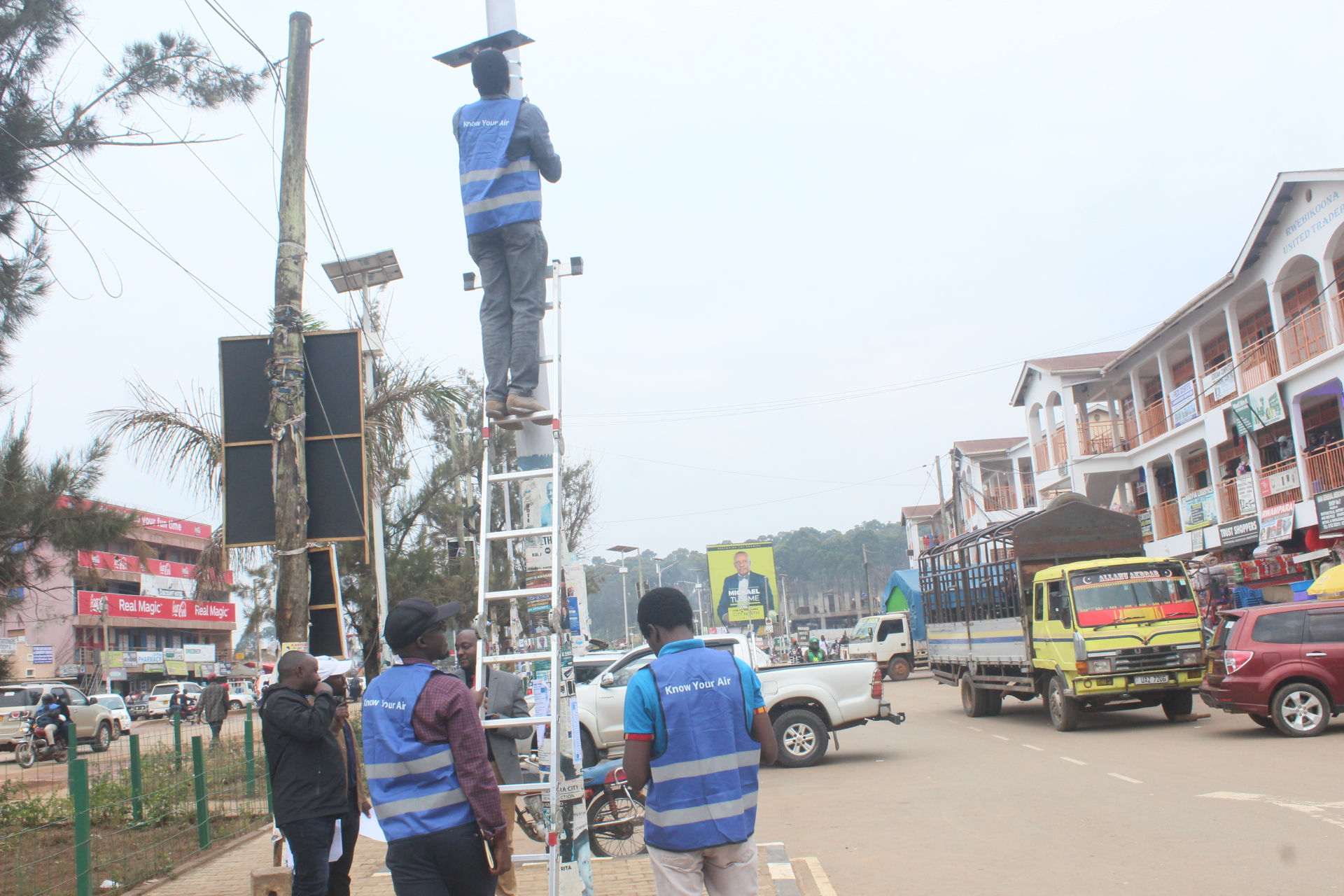MBARARA CITY, August 12, 2025 — Researchers from Makerere University’s AirQo Project have installed 15 air quality monitors at strategic locations across Mbarara City. The initiative, funded by the Energy Policy Institute at the University of Chicago [EPIC], aims to measure, analyse, and address air pollution as a critical component of climate change mitigation.
This development marks the establishment of Mbarara’s first continuous air quality monitoring network. According to Raja Fidel Wabinyai, a Data Scientist at AirQo, the network will provide real-time, publicly accessible data to support the enforcement of Uganda’s national air quality regulations. The data is expected to inform urban planning, targeted interventions, and public awareness campaigns.
“This is part of a scalable, data-driven initiative supporting the local implementation of Uganda’s national air quality standards. The network will offer open, timely air quality information to guide the city’s development and protect public health,” said Wabinyai.
The devices are designed to identify pollution sources and hotspots. Wabinyai noted that initial data from the first three sensors, installed at Mbarara University of Science and Technology [MUST], the Ministry of Water, and the city’s main market, has already shown relatively high levels of air pollution.
“We must first understand the extent of pollution in our environment in order to take effective action and ensure that the air we breathe is cleaner and healthier,” he added.
Gibson Oluka, a software engineering graduate from Makerere University, explained that the AirQo platform was developed in 2015 by a team led by Professor Engineer Bainomugisha. Originally focused on Kampala, the project has now expanded to include over 300 sensors across more than 15 cities in Uganda and other African nations, including Nairobi, Accra, and Maputo.
Leaders and residents respond
The initiative has received strong backing from both local and national leaders.
“Our approach ensures that Mbarara’s monitoring network aligns with local priorities and development goals,” said Deo Okure, Head of Research and Global Partnerships at AirQo, and the project’s lead. “By providing reliable local air quality data, we empower residents and leaders to make evidence-based decisions that safeguard public health and the environment.”
Barirega Akankwasah, Executive Director of the National Environment Management Authority [NEMA], described the collaboration as a “significant milestone” for public health in Uganda.
“By strengthening city-level monitoring capabilities, we’re enhancing Uganda’s ability to enforce air quality standards, improve environmental governance, and implement targeted, data-informed interventions,” he said.
David Sancho Nuwagaba, Principal Environment Officer for Mbarara City, highlighted the importance of real-time data in identifying pollution sources such as waste burning, vehicle emissions, and industrial smoke.
“These monitors will allow us to move beyond speculation and directly identify the causes of air pollution,” he stated.
He also called on residents and local leaders to protect the sensors from vandalism and support efforts to green the city through tree planting.
“We plan to engage stakeholders, local communities, and LC chairpersons to ensure these devices serve their intended purpose,” Nuwagaba added.
Mayor Robert Kakyebezi welcomed the initiative, saying the data would provide “real evidence” to guide council deliberations and inform practical responses such as tree planting and urban greening campaigns.
Silver Tugume, Head Teacher of Katukuru Primary School, expressed optimism that the monitors would be a valuable educational tool. He encouraged students, teachers, and parents to take active roles in environmental conservation by planting trees, protecting wetlands, and avoiding open burning of waste.
Health risks of air pollution
Globally, the World Health Organisation [WHO] attributes over 7 million premature deaths annually to urban air pollution. A 2021 study by the Health Effects Institute found that air pollution was the second-leading cause of death in East Africa, surpassed only by malnutrition.
In Uganda, a 2024 study by Makerere University researchers linked more than 7,200 deaths in Kampala between 2018 and 2021 to air pollution exposure.
The new monitoring network in Mbarara is part of a broader project aimed at creating a scalable, data-driven framework to improve air quality governance and support the implementation of Uganda’s national air quality standards.
https://thecooperator.news/nebbi-locals-scold-chinese-investors-over-pollution/
Buy your copy of thecooperator magazine from one of our country-wide vending points or an e-copy on emag.thecooperator.news
